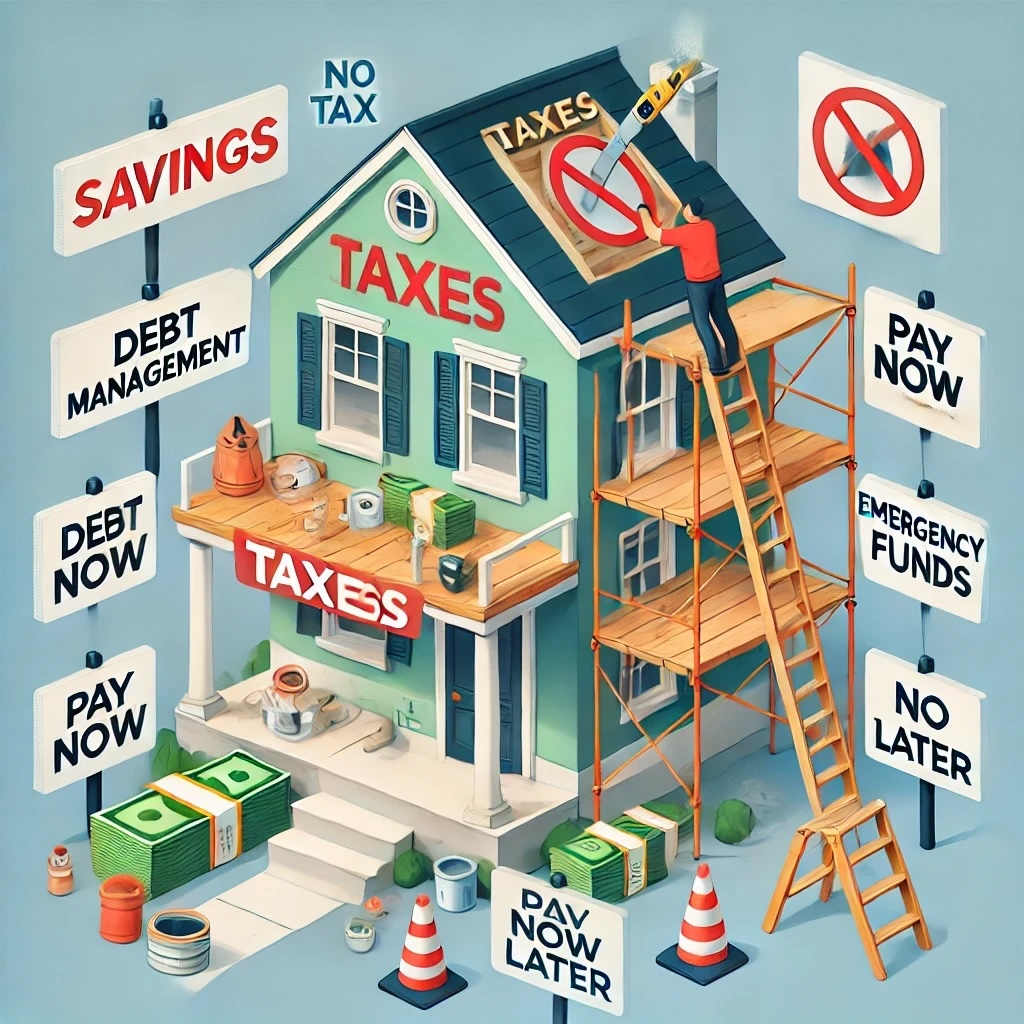As we build the Financial House, each level adds more structure and protection to our financial future. After stabilizing the First Floor with Debt Management, Emergency Funds, and Opportunity Funds, it’s time to move to the Second Floor—Taxes.
💰 Taxes are one of the biggest expenses in life—but most people don’t think of them that way. They’ve been conditioned to pay without questioning, with phrases like “There are only two certainties in life: death and taxes.” Society has accepted them as unavoidable, but that doesn’t mean we shouldn’t understand how to minimize them legally and keep more of what we earn.
For many, taxes feel like robbery, especially when governments overspend and fail to keep promises. They drain income in reverse, targeting job earners the most by keeping them in specific tax brackets. Unlike businesses, which benefit from tax strategies and deductions, employees often see their income heavily taxed before they even receive it.
This Second Floor of the Financial House is critical because it focuses on:
✅ Understanding how taxes affect your financial future
✅ Learning legal ways to minimize tax burdens
✅ Making smarter financial decisions that maximize wealth retention
For me, taxes impact every major financial decision I make—from buying property to starting a business. Should I incorporate? Should I buy a property under a corporation or trust for better estate planning? These decisions aren’t just about financial growth—they’re about keeping more of what I earn and securing a legacy for my family.
🚨 The real issue with taxes?
Governments aren’t transparent about how they use taxpayer money. There’s no option to opt out of services, no tracking system for satisfaction vs. cost, and no accountability on where tax dollars actually go. This is why understanding tax planning is crucial—not to avoid responsibility, but to ensure that we legally optimize what we owe and protect our financial future.
Common Tax Mistakes That Cost You Money
The reality is most people don’t even know how much tax they pay—and that’s where the problem begins. Without understanding how tax brackets work, they unknowingly move into higher tax tiers, losing more of their hard-earned income. But that’s just one mistake—there are several tax pitfalls that keep people financially stuck.
🚨 Common Tax Mistakes:
1️⃣ Not Knowing Your Tax Bracket & Overpaying
- People don’t track how much they earn and when they cross into higher tax brackets.
- Without tax planning, they could adjust income, contribute to tax-efficient accounts, or defer earnings to lower their liability.
2️⃣ Failing to Defer Taxes & Pay Less Over Time
- Many don’t realize they can defer taxes by using tax-advantaged accounts like RRSPs, pensions, and corporate structures.
- Deferring taxes means keeping more of your money now and paying when your tax rate is lower in the future.
- Business owners pay taxes at the end of the year, allowing them to earn interest on their money or reinvest it before settling their tax bill, instead of having it deducted from every paycheck.
3️⃣ Not Using Investment Strategies to Pay Less Tax
- Most people work, earn, and get taxed before they even touch their paycheck. But those who invest strategically can earn money and pay significantly less tax.
- With capital gains, dividends, and real estate income, taxes can often be cut in half compared to salaried income.
4️⃣ Ignoring Deductions & Writing Off Expenses
- Business owners pay less tax because they deduct expenses. Employees, on the other hand, don’t have the same flexibility.
- People in professions like lawyers, doctors, and realtors have documented income, making it easier to track deductions and lower tax bills—but even if you’re not in these fields, there are ways to legally reduce taxable income.
5️⃣ Not Having a Business or Corporate Structure
- Most people assume that business ownership is just for entrepreneurs, but in reality, starting a business or holding assets under a corporation or trust can significantly reduce taxes and build long-term wealth.
🚨 The biggest pitfall? Lack of education.
Taxes change every year, and most people don’t stay updated. The government won’t teach you how to pay less—it’s up to you to get educated. Speaking with tax professionals, financial advisors, and accountants is key to making sure you’re keeping as much of your income as possible.
Final Takeaway: Why Taxes Are Designed to Keep You in Line
Taxes are made complicated for a reason—so people don’t question the logistics. The tax code is designed to keep people employed and controlled. If someone took 30% of your blood, you’d die. If someone removed 30% of your car parts, it wouldn’t run. So why do we allow an entity to take 30% or more of our income without questioning it?
The answer is simple: Programming. We are taught how to obey, not how to question. But it’s time to break that cycle.
Let’s start with a simple question: Why do you pay taxes?
Thank you for reading—I hope this has helped open your mind and provoke some thoughts. If you’ve made it this far, you’re someone who is ready to take control of your financial future.
💡 The Financial Warrior is within you. Say no to people who take your money—educate yourself, question everything, and build your own legacy.

